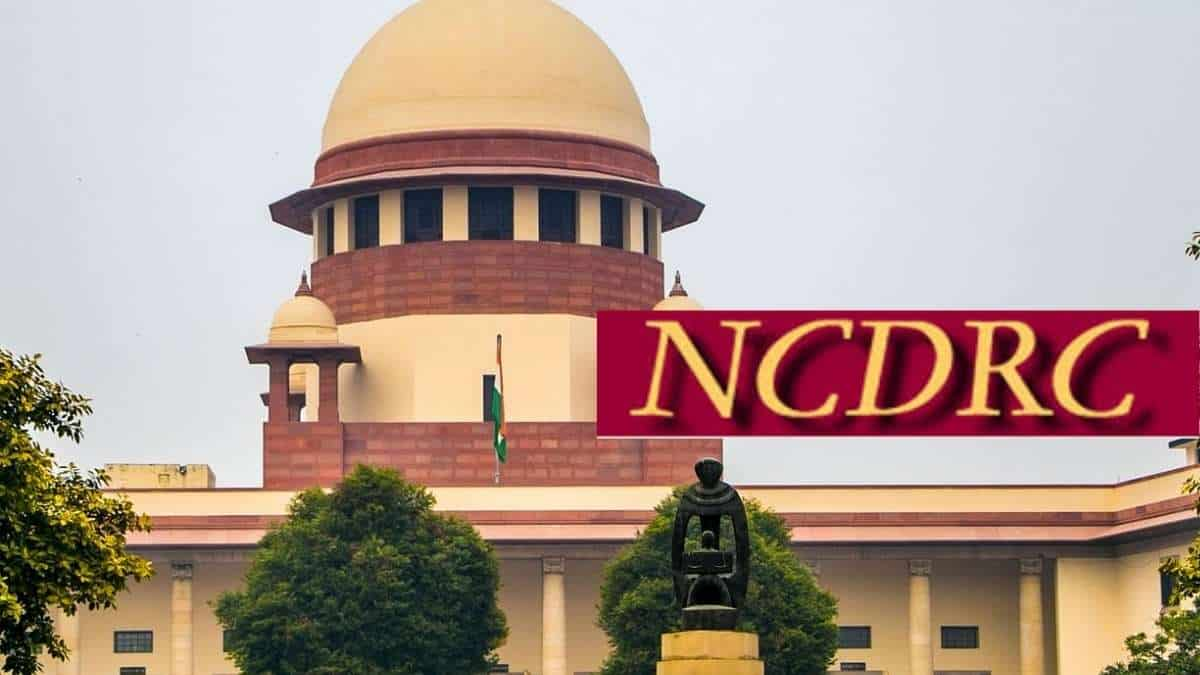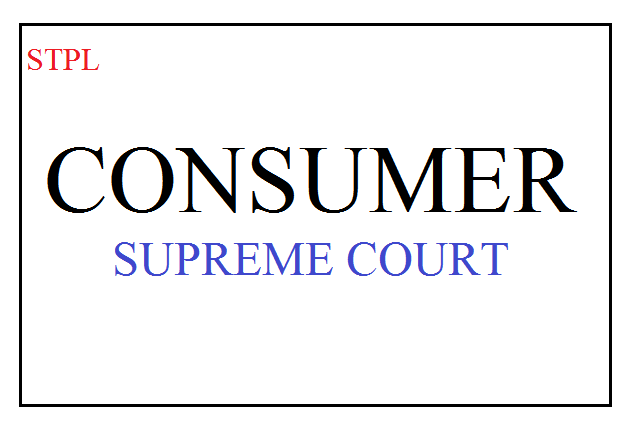SECOND APPEAL IN NCDRC ON Questions of law- Maintainable?
The National
Commission for Consumer Disputes (NCDRC) is a apex body for adjudication of
consumer disputes , subject to, of course, appellate remedy, wherever it is
provided before Supreme Court of India and writ remedy, if could be invoked in
apt cases before the High Court. The Second appeal is preferred before the
National Commission, against the order passed by State Commissions in 1st
appeal and only if substantial question of law is disclosed. In other words, if
substantial question of law is not framed and cannot be framed in the backdrop
of the facts, the second appeal cannot be entertained.
1.
In this
regard the NCDRC had occasion to deal with the issue in a matter captioned
as Retail Limited vs Diksha Goel Second Appeal
(SA) no. 01 of 2021and Second Appeal no. 2 of 2021, SA 3/2021, SA 7/2021, SA 8/2021and
SA 10/2021
2.
To set out the facts of the
case in brief, the above complaint was allowed by the District Commission and it
determined both 'deficiency in service' and 'unfair trade practice' on the part
of the appellant, thus, the act of Opposite Party by forcing the gullible
consumers to pay additionally for the carry bags is surely and certainly
amounts to deficiency in service and its indulgence into unfair trade
practice") and ordered that Rs. 7/- wrongly charged for the carry bag be
refunded to the complainant, Rs. 1000/- be paid to the complainant for
harassment and mental agony, Rs. 500/- be paid to the complainant as litigation
expenses and Rs. 10,000/- be deposited in the Consumer Legal Aid Account of the
District Commission. The first appeal filed by the appellant herein was
dismissed by the State Commission and it is held that the order passed by
District Commission-I partly allowing the consumer complaint did not need any
interference and as such, was upheld.
3.
The NCDRC, no doubt, had to
deliberate on question of law. If the findings were neither perverse nor any
material evidence were ignored by the foras below, no case of interference in
second appeal shall be warranted. In
case orders were passed on the basis of no evidence or if the foras below have drawn
unsustainable and wrong inferences beyond proved facts then the interference
may be warranted. In other words, on aspect of facts, the question of law are
not framed.
4.
Therefore, it needs no
elaboration that a question of fact or finding of fact is different from a question
of law and also that a question of law too is different from a substantial
question of law.
5.
Section 51(3) of the Act 2019 requires
that the memorandum of appeal should precisely state the substantial
question(s) of law involved in the appeal. Section 51 of the Consumer Protection
Act 2019 is being reproduced for reference:
51.
Appeal to National Commission.-
(1) Any person aggrieved by an order made by the
State Commission in exercise of its powers conferred by sub-clauses (i) or (ii)
of clause (a) of sub-section (1) of Section 47 may prefer an appeal
against such order to the National Commission within a period of thirty days
from the date of the order in such form and manner as may be prescribed:
Provided that the National Commission shall not
entertain the appeal after the expiry of the said period of thirty days unless
it is satisfied that there was sufficient cause for not filing it within that
period:
Provided further that no appeal by a person, who
is required to pay any amount in terms of an order of the State Commission,
shall be entertained by the National Commission unless the appellant has
deposited fifty per cent. of that amount in the manner as may be prescribed.
(2) Save as otherwise expressly provided under
this Act or by any other law for the time being in force, an appeal shall lie
to the National Commission from any order passed in appeal by any State
Commission, if the National Commission is satisfied that the case involves a
substantial question of law.
(3) In an appeal involving a question of law, the
memorandum of appeal shall precisely state the substantial question of law
involved in the appeal.
(4) Where the National Commission is satisfied
that a substantial question of law is involved in any case, it shall formulate
that question and hear the appeal on that question:
Provided that nothing in
this sub-section shall be deemed to take away or abridge the power of the
National Commission to hear, for reasons to be recorded in writing, the appeal
on any other substantial question of law, if it is satisfied that the case
involves such question of law.
(5)
An appeal may lie to the National Commission under this section from an order
passed ex parte by the State Commission.
6. It is worth mentioning that Section 51 of the 2019 Act is
similar to that of Section100 of the Code of Civil Procedure. It is
ultimately for the NCDRC to be satisfied that some substantial question of law
is involved in the matter, and it is for the NCDRC then, to formulate such
question of law and hear the appeal on that question (Section 51(4).
7. In case NCDRC do not find any such question of law which may
befittingly qualify to be called a substantial question of law and further, if findings
may be said to have not been arrived at on the basis of inadmissible material
or where the foras below have not fallen into the error of refusing to consider
some material declaring it to be inadmissible even though it was legally quite
admissible, then, it may not be contended that the findings have been arrived
at on the basis of no evidence. No doubt, it is equally true that settled
principles of law should not also be misapplied.
8. Similarly, the Supreme Court, in Reliance Retail Limited vs Dharam Pal[ SLP (C) No. 18376/ 2021] was converted in Civil Appeal in 2024 arising out of SLP (C) No.18376/2021.
The
NCDRC had dismissed the second appeal, as no substantial question of law was
said to have been arisen.
9. In Divya Chadri Vs President, Madhuvana House Building (SA NO. 25 OF 2022), the National Commission has held in para 7 as under:
07.
Hon'ble Supreme Court in the case of Karnataka Housing Board Vs. K.A. Nagamani, Civil Appeal No. 4631 of 2019 has held that the Revision
Petition U/S 21(b) of the Consumer
Protection Act, 1986 is not maintainable before this Commission which may be filed
against an Order passed by the State Commission in Appeal arising out of the
Execution Proceedings, as the Consumer Complaint is not pending. Principle laid
down by the Hon'ble Supreme
Court in Karnataka Housing Board (supra) would also
be applicable to an Appeal preferred under Sub Section 2 of the Section 51 of the Act, 2019
for the simple reason that Section 51 of the Act, 2019 provides for filing
an Appeal against an Order passed by the State Commission in exercise of its
power conferred by Sub Clauses (i) and (ii) of Clause (a) of Sub Section (1)
of Section 47 of the Act 2019. Similarly,
under Sub Clause (iii) of Clause (a) of Sub Section (1) of Section 47 of
the Act 2019, the State Commission has been given jurisdiction to pass Order in
an Appeal against the Orders of any District Commission within the State.
Though, a First Appeal under Sub Section (1) of Section 51 of the
Act, 2019, is not provided against an Order passed by the State Commission u/s
47 (1) (a) (iii) but a Second Appeal under Sub Section (2) of Section 51 of
the Act, 2019 has been provided. It may be mentioned here that
under Section 73 of the Act 2019, an Appeal has been
provided against an Order passed by the District Commission under Sub Section
(1) of Section 72 of the Act 2019, to the
State Commission and if the Order is passed by the State Commission to the
National Commission and further if the Order is passed by the National
Commission to the Hon'ble Supreme Court. Thus, the Order passed by the District
Commission in Execution Proceedings has to be challenged before the State Commission
only and thereafter, no further Appeal lies before this Commission as Complaint
is not pending. The Principles laid
down by the
Hon'ble Supreme Court in the case of Karnataka
Housing Board (Supra) will also apply to the Appeals arising out of Execution
Proceedings”.
What therefore
is implicit in the aforesaid discussion that second appeal shall lie before the
National Commission (NCDRC0 only in case the order is passed by State
Commission in first appeal and in the Memorandum of appeal the substantial
question of law are required to be proposed before NCDRC. The NCDRC shall have
to frame substantial question of law, if according to NCDRC, the question of
law indeed emerges and then, the same is required to be framed for adjudication.
However, if it appears to the NCDRC that no substantial question of law had
arisen, then, at that stage itself, the second appeal could be dismissed.
Moreover, in second appeal, so far as it relates to execution proceedings, the
same shall not lie as is held in Divya Chadri (Supra) by
the NCDRC. As indicated above, it is also no res integra that the second appeal u/s 51 of 2019 Act shall be
materially akin to Section 100 of Civil Procedure Code, relating to civil cases.
Thus, in a routine manner, substantial question of law cannot be framed. The
question of law can only be framed on the parameter as indicated above In case orders were passed
on the basis of no evidence or if the foras below have drawn unsustainable and wrong
inferences beyond proved facts, then, the interference may be warranted and not
otherwise.
-------
Anil K Khaware
Founder & Senior Associate
Societylawandjustice.com





